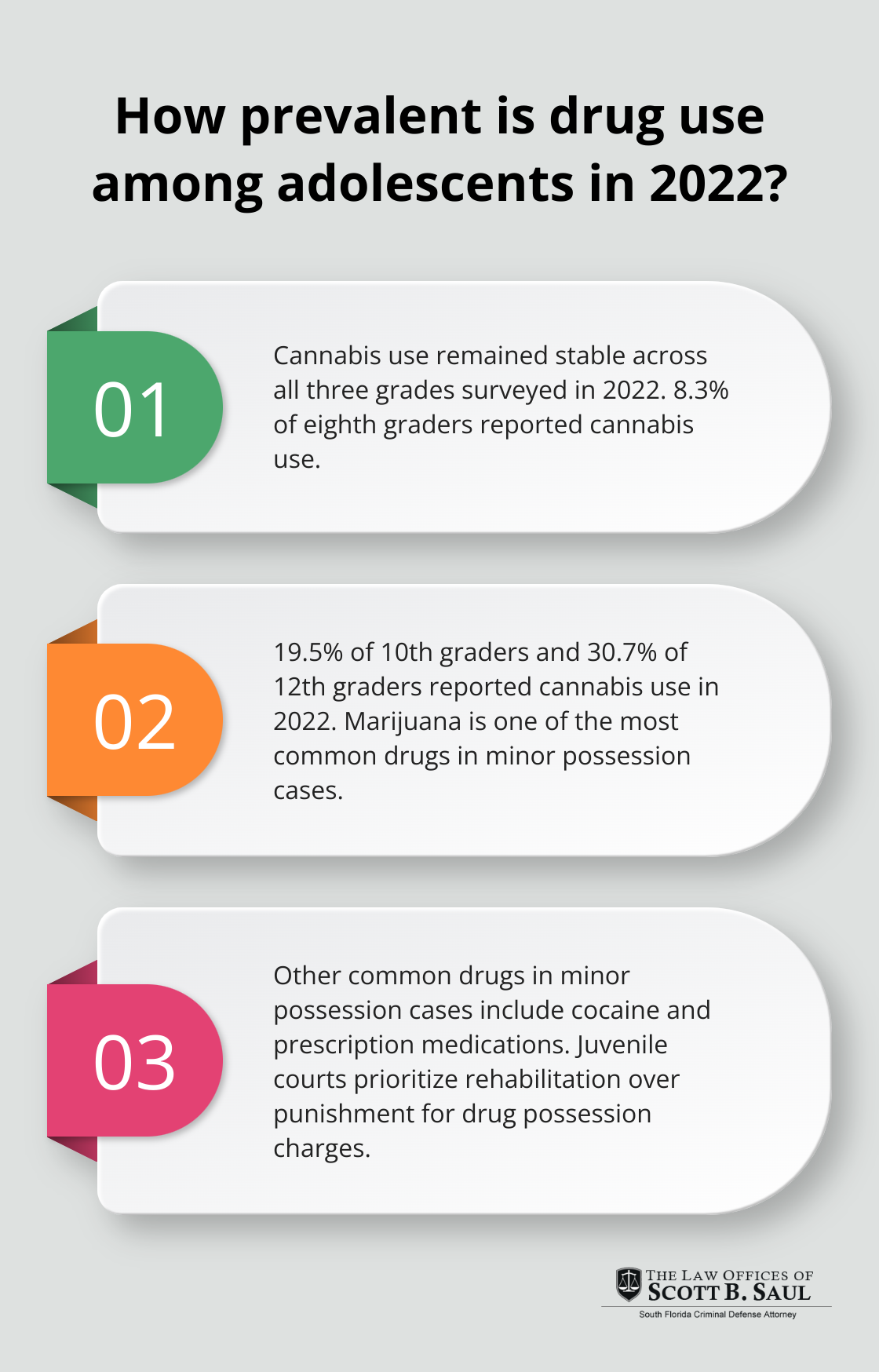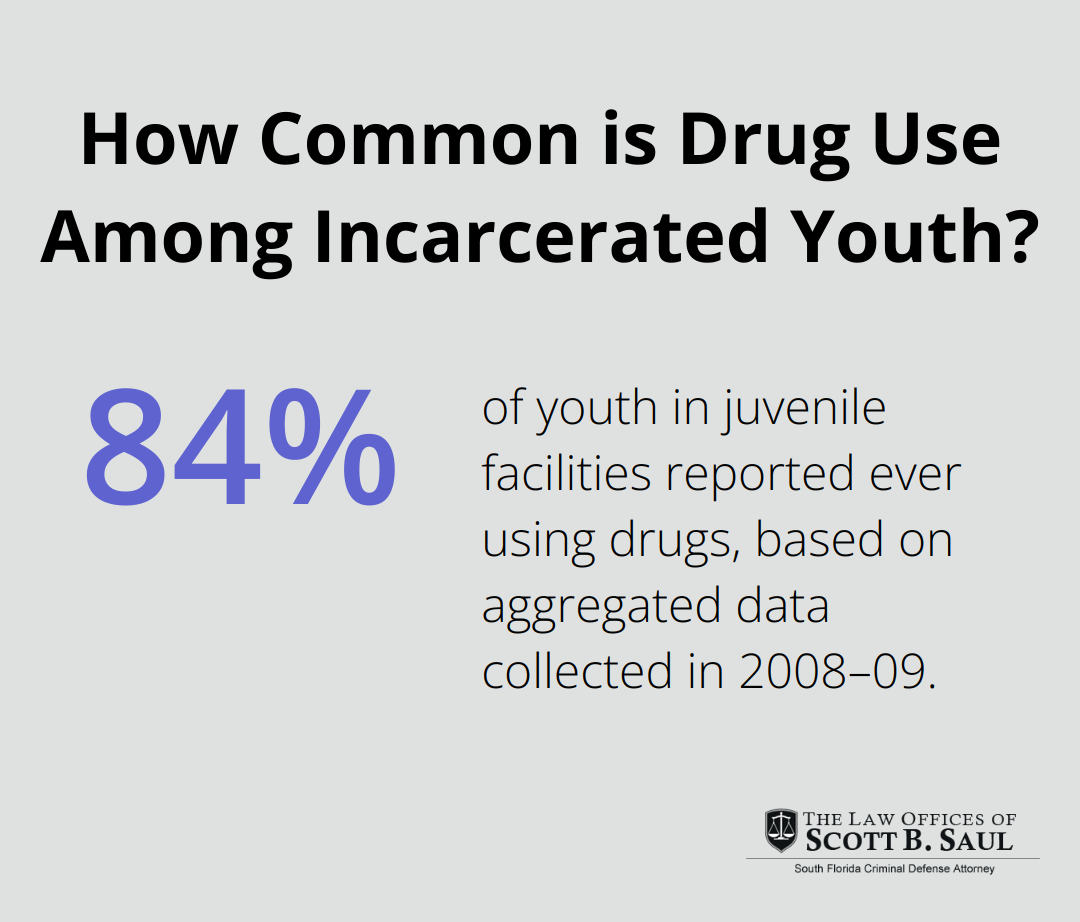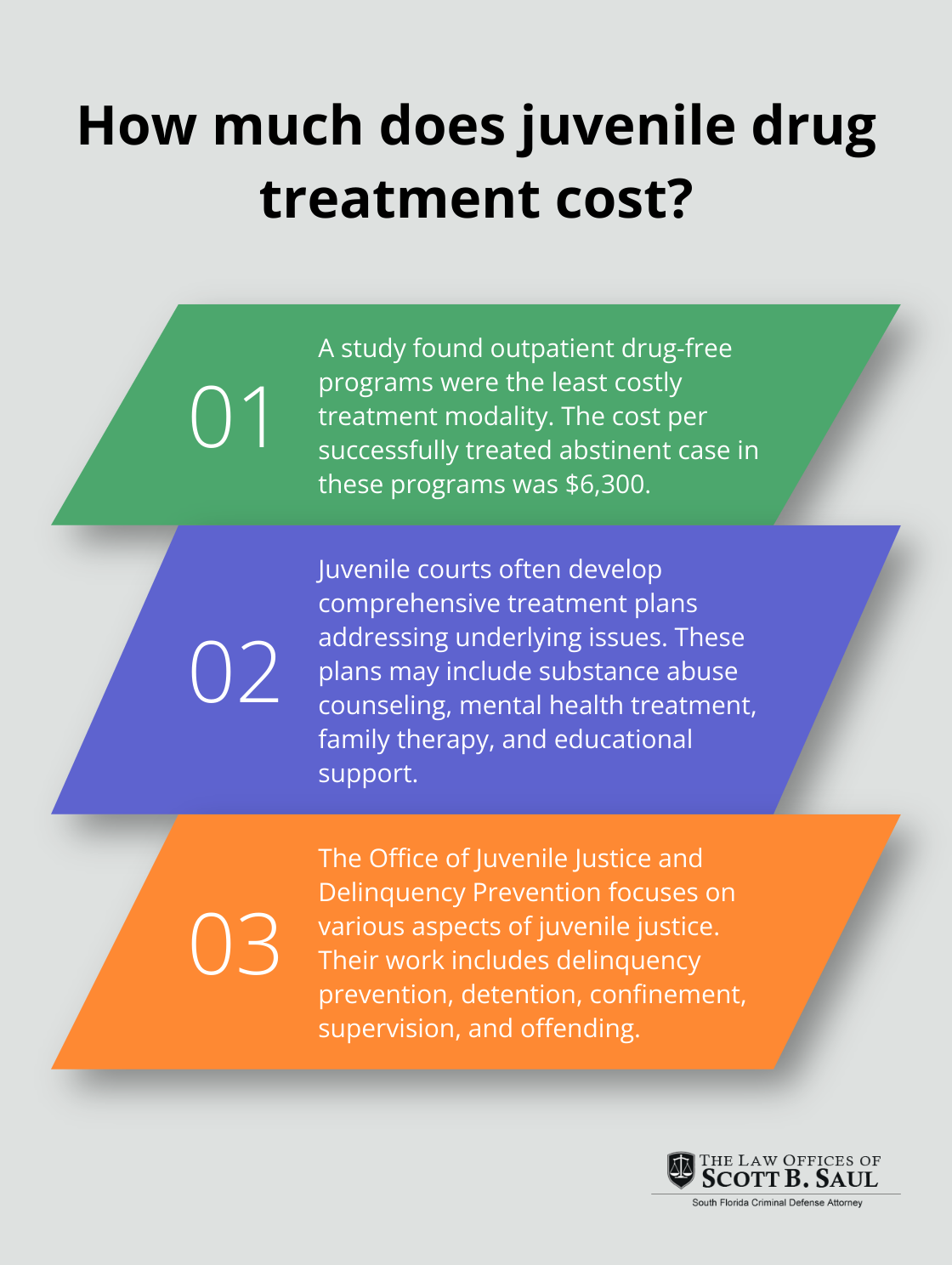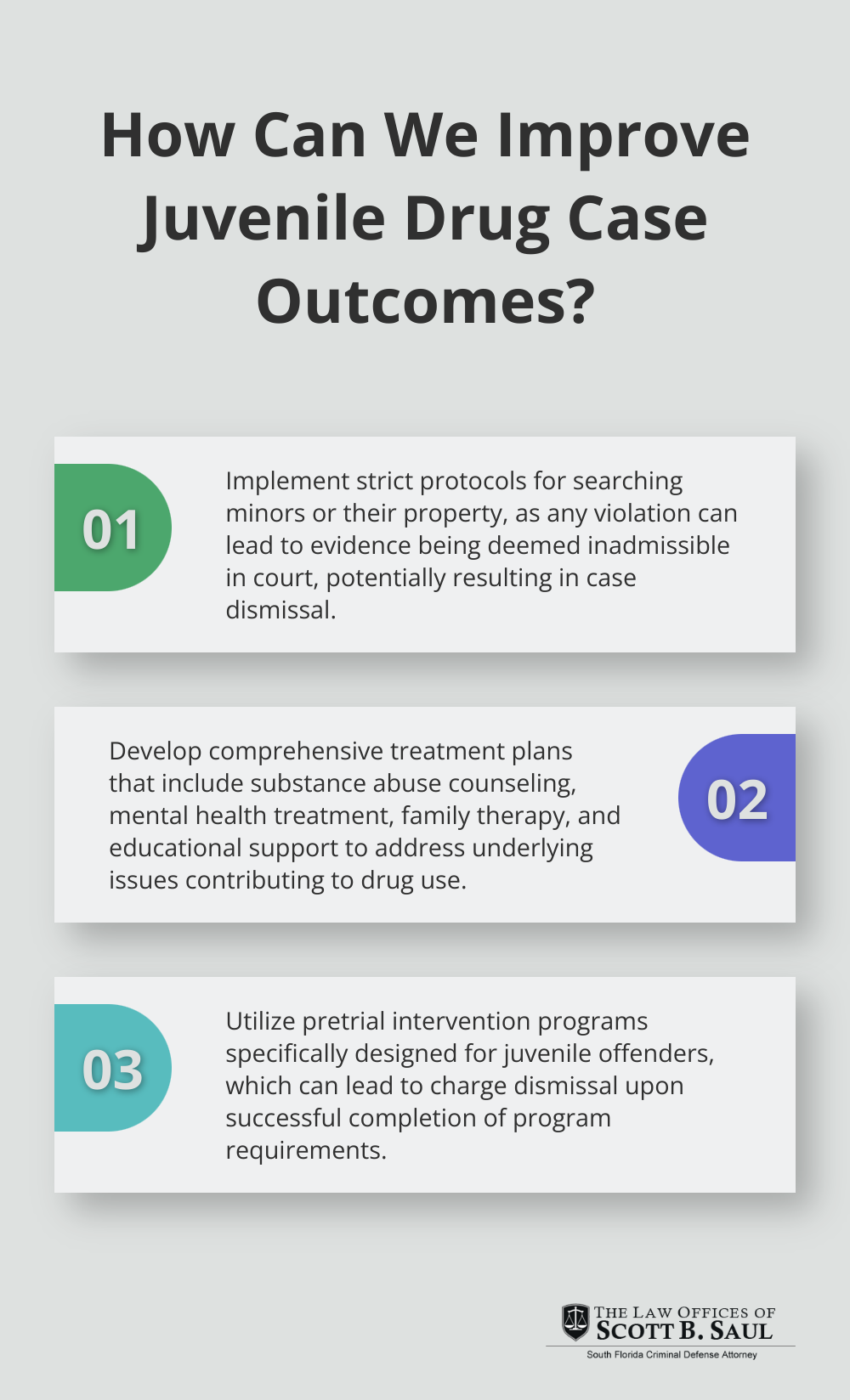How to Handle Drug Possession Charges for Minors
By : saulcrim | Category : Criminal Defense | Comments Off on How to Handle Drug Possession Charges for Minors
11th Apr 2025

Drug possession charges for minors can have serious consequences that extend far beyond the courtroom. At Law Offices of Scott B. Saul, we understand the complexities of these cases and their potential impact on a young person’s future.
This guide will explore the legal implications, defense strategies, and alternative sentencing options available for juveniles facing drug possession charges. Our goal is to provide valuable insights for parents and guardians navigating this challenging situation.
Understanding Drug Possession Charges for Minors
Definition of Drug Possession Charges
Drug possession charges for minors involve the illegal holding or control of prohibited substances by individuals under 18 years old. These charges can significantly impact a young person’s future education and career prospects.
Common Drugs in Minor Possession Cases
The most frequent drugs in minor possession cases include:
- Marijuana
- Cocaine
- Prescription medications (e.g., Adderall, Vicodin)
Cannabis use remained stable for all three grades surveyed, with 8.3% of eighth graders, 19.5% of 10th graders, and 30.7% of 12th graders reporting use in 2022.
Legal Distinctions for Minors
The legal system treats juvenile drug possession cases differently from adult cases. Juvenile courts prioritize rehabilitation over punishment. A well-structured punishment should provide room for reflection, growth, and learning rather than casting a shadow over a young person’s future. First-time offenders often qualify for diversion programs that focus on treatment rather than incarceration. The National Association of Drug Court Professionals confirms the effectiveness of these programs in guiding young individuals towards recovery and away from the justice system.
Factors Affecting Charge Severity
The severity of drug possession charges for minors varies based on several factors:
- Type and amount of drug
- Location of the offense (e.g., near a school)
- First-time or repeat offense

For example, in Florida, possessing less than 20 grams of marijuana (a first-degree misdemeanor for minors) can result in up to one year in juvenile detention and a $1,000 fine.
Legal Representation
Experienced legal representation proves essential in navigating the complexities of juvenile drug possession cases. Attorneys with backgrounds as former prosecutors (such as those at the Law Offices of Scott B. Saul) possess unique insights into building effective defense strategies. They focus on protecting young clients’ rights and future opportunities, always striving for the best possible outcome in each case.
As we move forward, we’ll explore the specific legal consequences and penalties that minors may face when charged with drug possession.
What Happens After a Minor’s Drug Possession Charge?
Legal Consequences for Juvenile Drug Possession
Juvenile drug possession charges carry significant legal consequences. The severity of sentences varies widely depending on factors such as the type and amount of drug, location of the offense, and whether it’s a first-time or repeat offense. In Florida, a minor caught with less than 20 grams of marijuana could face up to one year in juvenile detention and a $1,000 fine.

Judges in juvenile courts often have more discretion than in adult courts. They may choose alternatives to detention, such as probation, community service, or mandatory drug education programs. An estimated 84% of youth in juvenile facilities reported ever using drugs, based on aggregated data collected in 2008–09, which underscores the need for treatment-focused approaches.
Diversion Programs and Alternative Sentencing
Many jurisdictions offer diversion programs specifically designed for first-time juvenile offenders. These programs keep young people out of the traditional court system and provide opportunities for rehabilitation. Successful completion often results in charges being dismissed or reduced.
Common elements of these programs include:
- Drug education classes
- Counseling or therapy sessions
- Regular drug testing
- Community service
The Office of Juvenile Justice and Delinquency Prevention found that youth who participated in diversion programs were 2.5 times less likely to reoffend compared to those processed through traditional juvenile justice systems.
Impact on Education and Employment
A drug possession charge can have far-reaching consequences beyond the immediate legal penalties. Many colleges and universities ask about criminal history on applications, and a drug-related offense could affect admission decisions or scholarship opportunities.
In the job market, even juvenile records can sometimes be accessed by potential employers (particularly for positions in law enforcement, education, or healthcare). The overall employment rate over four years after release for individuals with criminal records hovered between 34.9% and 37.9%.
Many states have laws that allow for the sealing or expungement of juvenile records. This process can help mitigate long-term impacts, but it requires proper legal procedures. Experienced attorneys can guide clients through this process to protect their future opportunities.
Early Intervention and Treatment
Early and effective intervention plays a key role in juvenile drug possession cases. The National Institute on Drug Abuse states that for every dollar spent on addiction treatment programs, there is a $4 to $7 reduction in drug-related crime costs.
Addressing underlying issues that may have led to drug use, such as mental health concerns or family problems, can prevent future offenses. Many juvenile courts now incorporate comprehensive assessments to identify these factors and tailor interventions accordingly.
As we move forward, we’ll explore effective strategies for defending minors against drug possession charges, including challenging the legality of searches and exploring treatment options.
Effective Defense Strategies for Juvenile Drug Cases
Scrutinizing Search and Seizure Procedures
One of the most effective defense strategies challenges the legality of the search and seizure that led to the drug discovery. Police must follow strict protocols when searching minors or their property. Any violation of these procedures can lead to evidence being deemed inadmissible in court.

In a recent Florida case, evidence was thrown out when officers searched a minor’s backpack without probable cause or consent. This resulted in the charges being dismissed entirely. Experienced attorneys meticulously examine every detail of the arrest and search process to identify potential constitutional violations.
Advocating for Treatment-Based Solutions
Another powerful strategy advocates for treatment and rehabilitation options instead of punitive measures. A study found that the cost per successfully treated abstinent case in the least costly modality, outpatient drug-free programs, was $6,300.
Attorneys often work with juvenile courts to develop comprehensive treatment plans that address underlying issues contributing to drug use. These plans may include:
- Substance abuse counseling
- Mental health treatment
- Family therapy
- Educational support
Demonstrating a commitment to rehabilitation can often persuade prosecutors and judges to consider alternatives to traditional sentencing.
Negotiating Favorable Plea Agreements
In some cases, negotiating a plea agreement may be the best course of action. Experienced attorneys leverage their understanding of local court systems and relationships with prosecutors to secure the most favorable terms possible.
A well-negotiated plea deal might include:
- Reduced charges (e.g., from felony to misdemeanor)
- Deferred adjudication (charges dismissed upon completion of specific requirements)
- Minimal probation terms
- Expungement opportunities upon successful completion of probation
In a recent case, attorneys negotiated a plea agreement for a first-time offender that resulted in all charges being dropped after the completion of a six-month drug education program and 100 hours of community service.
Utilizing Pretrial Intervention Programs
Many jurisdictions offer pretrial intervention programs specifically designed for juvenile offenders. These programs provide an opportunity for charges to be dismissed upon successful completion of certain requirements.
The Office of Juvenile Justice and Delinquency Prevention focuses on various aspects of juvenile justice, including delinquency prevention, detention, confinement, supervision, and offending.
Attorneys actively seek out these programs for eligible clients, as they offer a path to avoid a criminal record while addressing the underlying issues that led to the drug possession charge.
Final Thoughts
Drug possession charges for minors require a delicate balance of legal expertise and rehabilitation focus. The Law Offices of Scott B. Saul prioritizes protecting clients’ rights while advocating for solutions that emphasize growth and recovery. Our team brings over three decades of experience in criminal defense, including a unique perspective from our founder’s background as a former prosecutor.

The consequences of these charges extend far beyond the courtroom, affecting educational opportunities, future employment, and housing options. Skilled legal representation early in the process can help minimize potential long-term impacts and focus on rehabilitation. The goal in juvenile cases is not just to resolve the immediate legal issue, but to set young individuals on a path towards a brighter future.
With the right approach and support, it’s possible to turn a challenging situation into an opportunity for positive change. Our team at Law Offices of Scott B. Saul stands ready to craft effective defense strategies tailored to each client’s specific situation. We invite you to contact us for a consultation to discuss how we can help navigate these complex legal waters.
Archives
- July 2025 (1)
- June 2025 (9)
- May 2025 (9)
- April 2025 (8)
- March 2025 (9)
- February 2025 (8)
- January 2025 (9)
- December 2024 (10)
- November 2024 (5)
- July 2024 (2)
- June 2024 (2)
- May 2024 (2)
- April 2024 (2)
- March 2024 (2)
- February 2024 (2)
- January 2024 (2)
- December 2023 (2)
- November 2023 (2)
- October 2023 (2)
- September 2023 (2)
- August 2023 (1)
- July 2023 (2)
- June 2023 (2)
- May 2023 (2)
- April 2023 (2)
- March 2023 (2)
- February 2023 (2)
- January 2023 (2)
- December 2022 (2)
- November 2022 (2)
- October 2022 (2)
- September 2022 (2)
- August 2022 (2)
- July 2022 (2)
- June 2022 (2)
- May 2022 (2)
- April 2022 (2)
- March 2022 (2)
- February 2022 (2)
- January 2022 (2)
- December 2021 (2)
- November 2021 (2)
- October 2021 (2)
- September 2021 (2)
- August 2021 (2)
- July 2021 (2)
- June 2021 (2)
- May 2021 (2)
- April 2021 (2)
- September 2020 (5)
- July 2020 (4)
- June 2020 (4)
- May 2020 (4)
- April 2020 (5)
- March 2020 (4)
- February 2020 (4)
- January 2020 (4)
- December 2019 (1)
- November 2019 (4)
- October 2019 (4)
- September 2019 (4)
- August 2019 (4)
- July 2019 (5)
- June 2019 (4)
- May 2019 (4)
- April 2019 (4)
- March 2019 (4)
- February 2019 (4)
- January 2019 (4)
- December 2018 (4)
- November 2018 (5)
- October 2018 (5)
- September 2018 (4)
- August 2018 (4)
- July 2018 (7)
- June 2018 (4)
- May 2018 (4)
- April 2018 (8)
- March 2018 (4)
- February 2018 (4)
- January 2018 (4)
- November 2017 (4)
- October 2017 (4)
- September 2017 (4)
- August 2017 (7)
- July 2017 (6)
- June 2017 (4)
- May 2017 (4)
- April 2017 (4)
- March 2017 (4)
- February 2017 (7)
- January 2017 (4)
- December 2016 (7)
- November 2016 (4)
- October 2016 (4)
- September 2016 (10)
- August 2016 (4)
- July 2016 (4)
- June 2016 (4)
- May 2016 (4)
- April 2016 (4)
- March 2016 (4)
- February 2016 (7)
- January 2016 (4)
- December 2015 (5)
- November 2015 (4)
- October 2015 (7)
- September 2015 (4)
- August 2015 (4)
- July 2015 (13)
- June 2015 (9)
- May 2015 (8)
- April 2015 (6)
- March 2015 (4)
- February 2015 (4)
- January 2015 (4)
- December 2014 (4)
- November 2014 (4)
- October 2014 (4)
- September 2014 (3)
Categories
- Adjudication (1)
- Bankruptcy (1)
- Burglary Crimes (3)
- calendar call (1)
- Car Accident (1)
- Criminal Defense (332)
- Cyber Crimes (7)
- DNA (1)
- Domestic Violence (9)
- Drug Crimes (5)
- DUI (12)
- Embezzlement (1)
- Environmental Crimes (4)
- Expungement Law (2)
- Federal Sentencing Law (3)
- Firearm (3)
- Forgery (4)
- General (82)
- Healthcare (3)
- Immigration (1)
- Indentity Theft (1)
- Insurance (5)
- judicial sounding (2)
- Juvenile Crimes (4)
- Manslaughter (4)
- Money Laundering (3)
- Organized Crime (1)
- Racketeering (1)
- Reckless Driving (3)
- RICO (3)
- Sealing and Expunging (2)
- Sex Offense (1)
- Shoplifting (1)
- Suspended Driver's License (1)
- Traffic (4)
- Trending Topics (1)
- White-collar Offenses (1)

